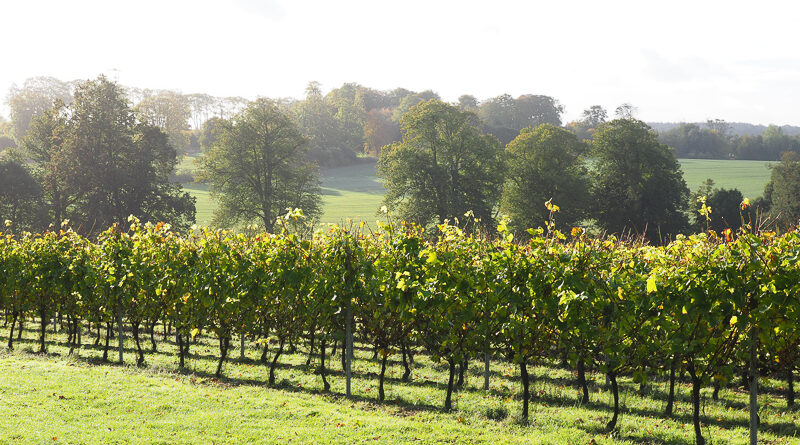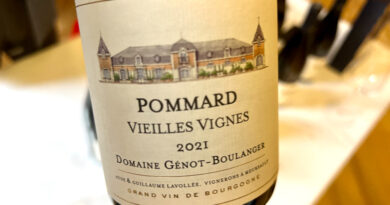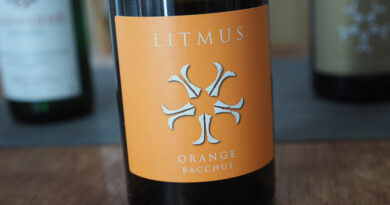Simpsons Wine Estate: leading still and sparkling wines from the Kent North Downs, England
Website: https://simpsonswine.com/
Jamie Goode and Lisse Garnett visit a relatively new winery in the Kent North Downs who are making waves with their still wines, but who also make excellent sparkling too.
Charles and Ruth Simpson’s mutual adventure began at St Andrews University where they were both undergraduates, and the two have been inseparable ever since. After university they relocated to Azerbaijan where Charles opened up pharmaceutical markets and Ruth toiled in refugee camps, having taken up nursing to focus on humanitarian aid. This was pre Soviet collapse: they might have opted for an easier path but that is not the way of this intrepid pairing. It was Ruth who then decided to take a distance course in viticulture. Books had to be sent from Australia via Moscow – there was no online study back then. This inspired decision ultimately led to the rehabilitation and formation of two successful wine estates, one – Domaine Sainte Rose in the Languedoc (purchased with the proceeds of a London flat) and the other Simpsons, a new estate they have created from scratch on Kent’s North Downs. Both have thrown up their challenges, but this couple’s pioneering spirit continues undaunted. Today they are producing some 60% still wines from Kentish grapes in a marginal climate that offers no room for error.
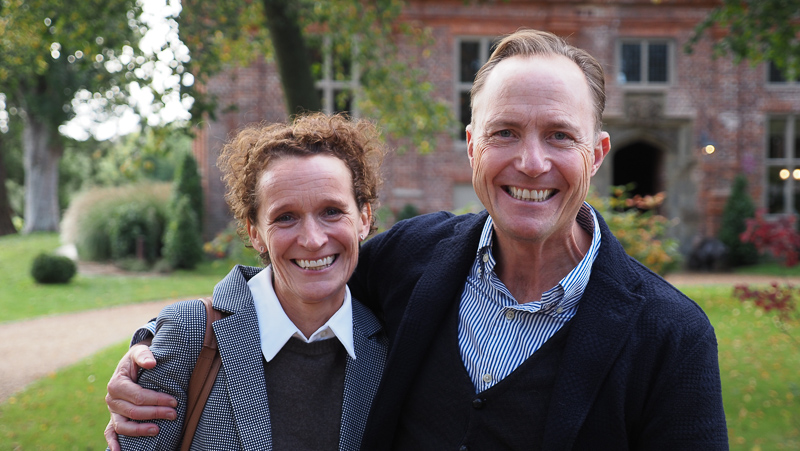
From their two vineyards in east Kent today, Charles and Ruth Simpson are making some of the UK’s most highly acclaimed still wines, even though their original intention was to focus on sparkling. When they started here, they’d already had their winery in the Languedoc for over a decade – Domaine Sainte Rose, where they make wines for some of the UKs leading supermarkets. They felt this experience would stand them in good stead when they began their Kent wine project, back in 2014. And while selling Languedoc wines has been quite a challenge, they’ve found it much easier to find a home for their English bottles.
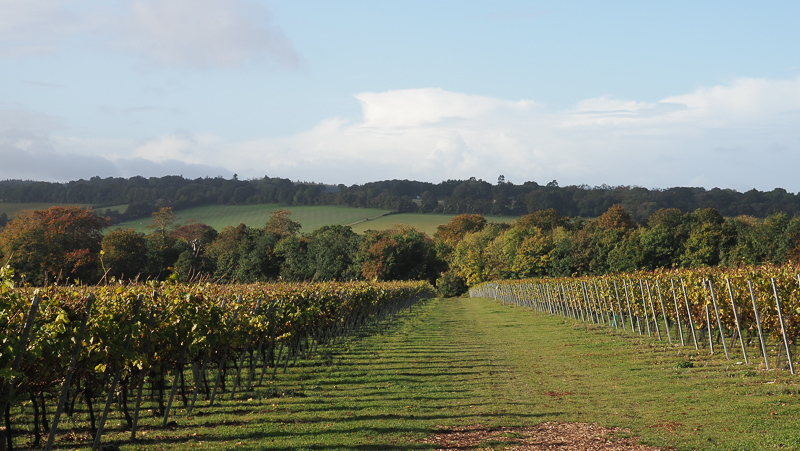
‘We knew there would be high demand but we didn’t know we could sell what we make ten times over,’ says Charles. ‘We have chosen not to launch in certain markets because we just don’t have the volume. These are markets that we had never expected to be so interested in our wines, like Norway: they would take all of it if they possibly could. We could sell them 100k bottles of English Chardonnay if we had it. They get it, they understand cool climate wines, they appreciate the quality and they are not afraid to pay for it.’
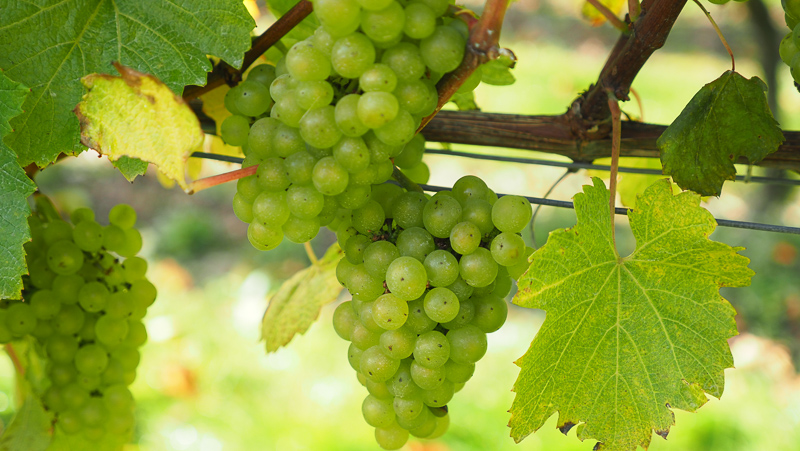
Charles says that there’s quite a contrast between selling their Languedoc wines and their English ones. ‘We sell to Waitrose from both the French estate and the English estate. When you go to Bracknell [Waitrose’s headquarters], and you go into the French wine buyer’s room where the key question is “How much is it?” while in the English room it’s “How much can you give me?”’
‘We never set out to make any still wines here,’ says Ruth. ‘That’s what we are used to doing in the South of France. We didn’t think we would be able to get the grapes consistently ripe enough to make stills but we’ve been proved wrong.’
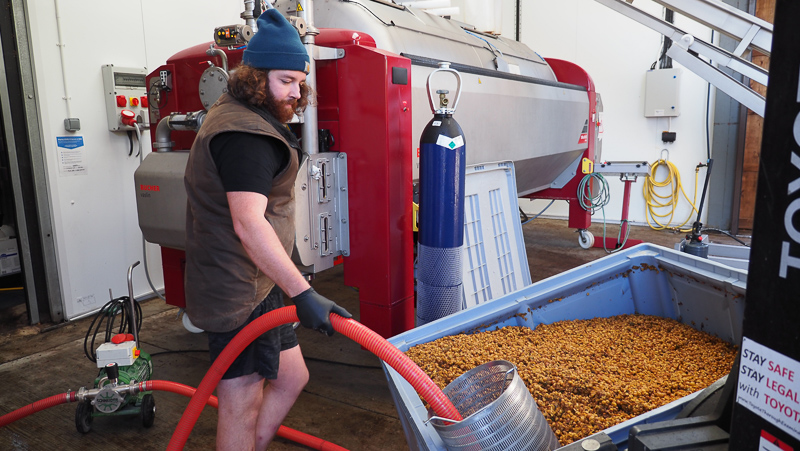
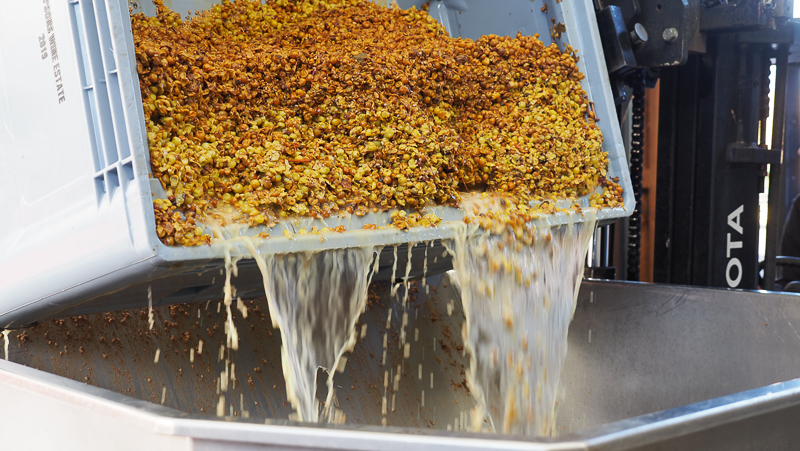
She says that they made a good choice planting some of the Burgundian clones Chardonnay and Pinot Noir, because they are great for the still wines. ‘Still is really gathering momentum but many producers have planted only Champagne clones. They are very limited therefore as far as some of the styles they can actually produce,’ she says. ‘Since 2018 we have been making a significant percentage of still wines. Last year we produced 60% still wines. It’s excellent for cash flow too.’
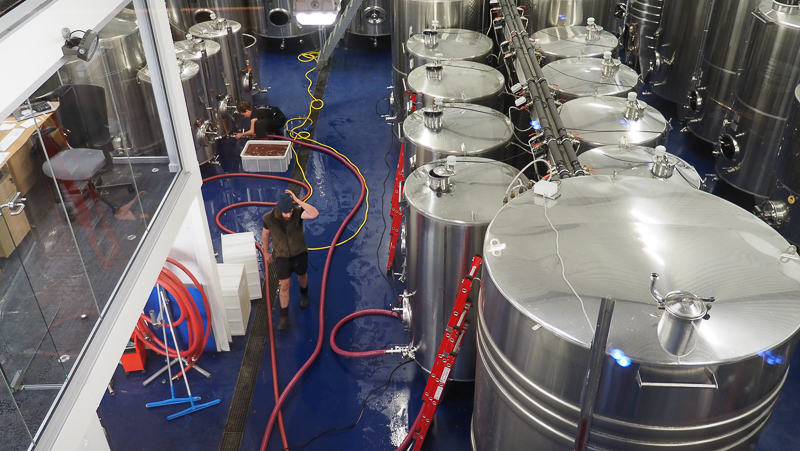
They have two main vineyards: the Roman Road and Railway Hill. Both have a shallow top soil, and then 25 cm down they are solid chalk, with a high proportion of active limestone. The pH of both is about 8. They used a team from the Languedoc to plant Roman Road back in May 2014. ‘They thought they were coming to rainy crummy England,’ says Ruth, ‘and when they saw the terroir their eyes popped out.’
2016 was the first harvest. ‘We picked some 548 (for sparkling) and as it was going through primary fermentation it was just so interesting we thought, let’s do 600 bottles of still Chardonnay and see how it goes,’ says Ruth. ‘That was the very first Roman Road Chardonnay we produced. We had so few to sell, but we allocated some to the shop here. We had no idea whether people would buy this – it was a £23 bottle of wine – so we sent a sales woman down to the shop thinking she was just going to pour a few bottles for everyone to taste, and there was a queue outside the door. Everyone wanted a bottle of wine with Barham on the label.’
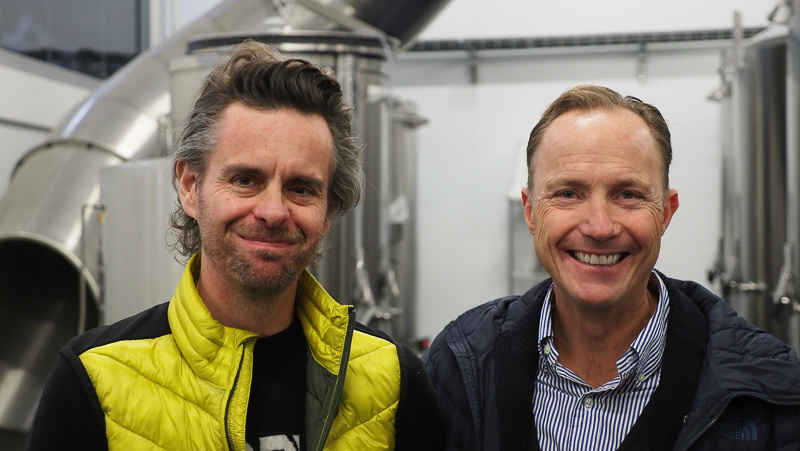
‘Labour is increasingly an issue,’ says Ruth, ‘even for simple jobs like lifting the wires. A lot of the larger producers were sucking up all the labour because they could guarantee it for more days at a time. It’s been a challenge all year and I don’t think it’s going to change anytime soon.’
They built a winery out of two 400 m2 barns. ‘In the wine world you should take the space you need and double it and even then you won’t have enough,’ says Charles. ‘That’s exactly what happened here.’ They have added bits and pieces, and then last year they managed to get a large building from the farmer next door. ‘There was a big farm next door and they had draft planning for housing, and so the owner wanted a ridiculous sum of money,’ says Charles. ‘But due to Covid and builders pulling out of development projects he sold them to us.’ They have renovated the building, put in refrigeration and also 30 kw of solar panels.
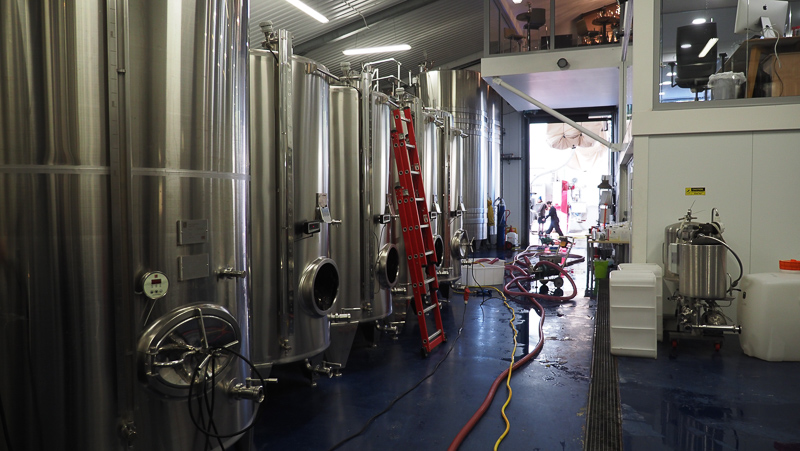
The growth is continuing: the day we visited the Simpsons were waiting to hear about an offer they have put in for another 10 hectares of very promising potential vineyard land, which will take them to the size they’d like to be (they currently have 27 hectares of vines), and ensure they have a full winery most years. We are happy to report this acquisition was successful.
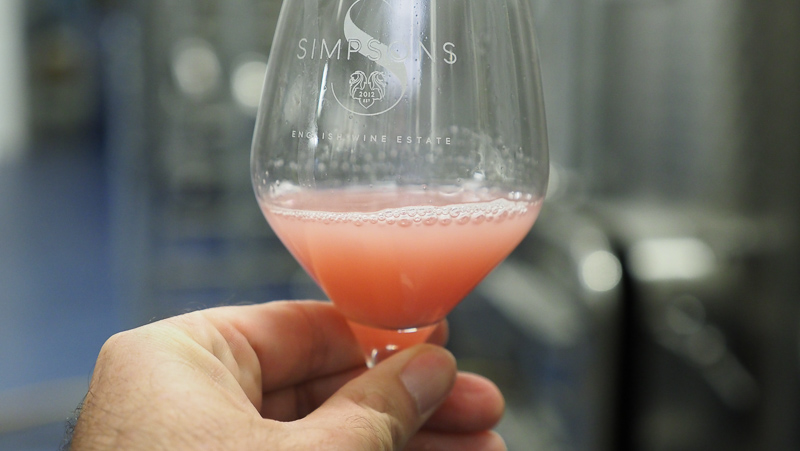
‘I think the unique position Ruth and I were in,’ says Charles, ‘unlike a lot of English producers, is that we have been doing this for twenty years, we are not putting the cart before the horse, and we had a ready business.’ They export Saint Rose to 20 different markets around the world. ‘We had been talking about English wine to our importers for about eight years and they were going would you just shut up talking and bloody make some!’
‘We already knew the channels to market – they are established – and we know how to make wine because we have been doing it for twenty years. The only thing we needed to get our head round was growing in England and obviously some of the assumptions we made in the early days about yields.’ Yields in the UK are lower than they’d thought they’d be, but the bigger problem is the inconsistency. ‘We thought that with 30 hectares we could consistently crush about 200-250 tonnes, but not a chance.’ The average yield in the UK is around 8 tonnes per hectare, but Charles explains that in some years you get 12 and in others just 3, for example, which makes planning difficult. It also means that in order to process the big years, you need a winery with excess capacity for the other years.
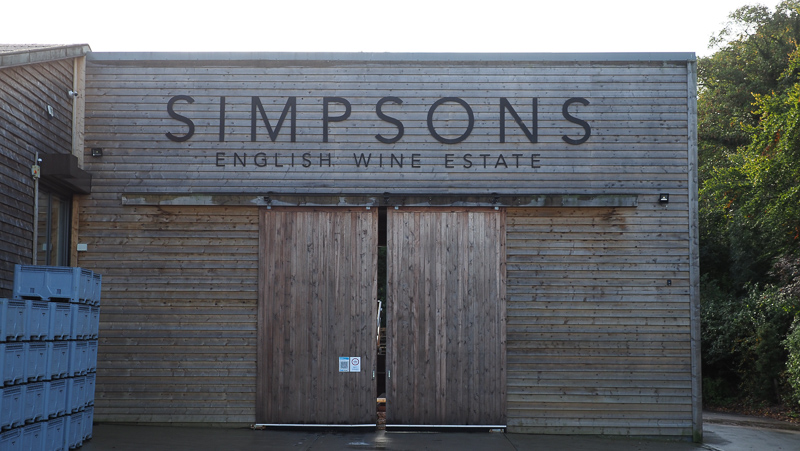
Many of their grapes are machine harvested. ‘Machine harvesting adds value from the still wines perspective because you want phenolics,’ says Charles, ‘you want solids in the wines.’ The Pellenc harvester they rent not only destems, but also sorts.
They also have frost fans, which they have imported from Turkey. These are not fixed, but they know where they need to put them during the frost risk season. They also have bougies (frost candles). ‘We spent an absolute fortune on weather data,’ he says. ‘We bought 10 years of satellite data for our sites, and when we plotted the UK weather incidences over this particular site we thought we had bought frost free vineyards. But we’ve had a frost every single year and the reason being is that what we didn’t understand is how warm we are here in Kent – we plotted the UK growing cycle but its generic across the whole country. So we are budding earlier, we are exposed earlier, we thought we were going to get budbreak in May and we are getting it in early April. The frost comes on the same days every year, its somewhere between the 18th and the 25th of April. It is like clockwork – like flicking a switch. It is unbelievable.’
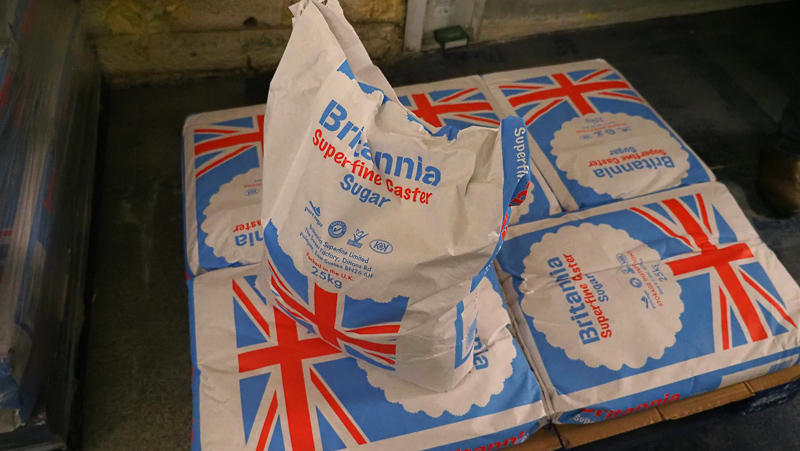
Their winemaker is Leigh Sparrow, who also works with their Languedoc domaine. So just as he finishes at Sainte Rose, he’s got to start all over again in Kent. When we visited it was mid-harvest, in a very late year: the 2021 vintage was slow to start, and then summer was wet and cool. Fortunately, a warm, sunny autumn helped the grapes get over the line, but yields are low and quite a bit of chaptalization will be required. Leigh showed some of the baby wines, which were looking good. We also caught them pressing off some skin fermented Chardonnay, which is used as a blending component to add a bit of oomph to their still Chardonnays. Simpsons is also one of the few wineries to have an Inertys press, which has a nitrogen lung than makes it possible to avoid oxygen contact during pressing. They don’t always use the lung, but it is a really useful tool if you want to protect the juice at press stage.
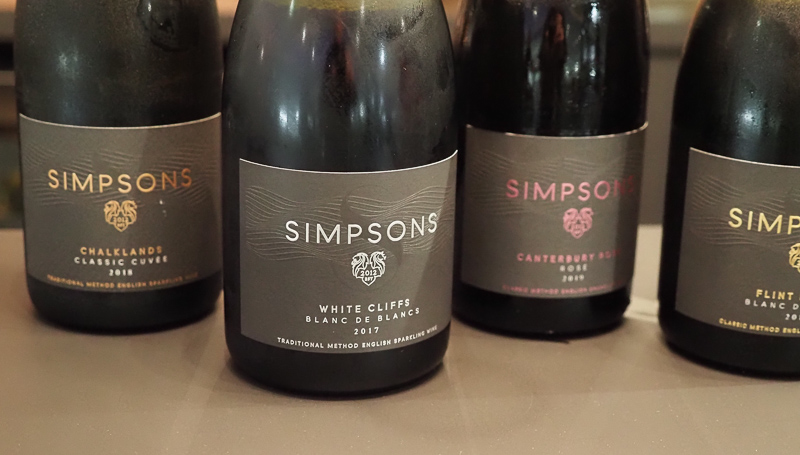
THE WINES
Simpsons Canterbury Rose 2019 Kent, England
12.5% alcohol. This is leafy, sappy and direct with fresh berry fruit. Keen acidity, and nice fruit purity with stewed strawberry and cherry fruit. Very stylish. 90/100
Simpsons Chalklands Classic Cuvée 2018 Kent, England
Fresh, direct and with a slightly creamy edge to the ripe citrus and apple fruit. Some toastiness. There’s good acidity here but not too much of it. Lovely bright fruit complemented by patisserie notes. 91/100
Simpsons Flint Fields Blanc de Noirs 2018 Kent, England
Lively aromatic fruit here with cherry, lemon and pear on the nose. Has a supple personality with juicy, fresh cherry and aniseed notes and a touch of creaminess. Focused and fruity with nice bitter notes on the finish. 92/100
Simpsons White Cliffs Blanc de Blancs 2017 Kent, England
This spends three years on the lees. Fresh, assertive citrus fruit with fine herbal hints and a touch of green. The palate has a herbal edge to the citrus and green apple fruit. This has a juicy, tart citrus core and some creamy notes in support. 91/100
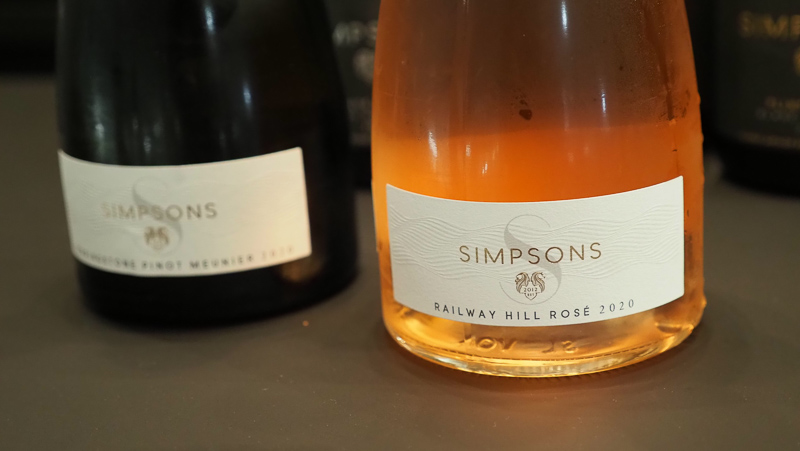
Simpsons Railway Hill Rosé 2018 Kent, England
12.5% alcohol. Beautifully packaged with a Vinolok glass stopper in an elegant tapered bottle, this is a pale-coloured Pinot Noir rosé with some sweet strawberry and cherry fruit as well as brisk grapefruit and lime notes, and even a little exotic lychee character. Bright, zesty and a bit spicy, this is the real deal. Dry and gastronomic. 90/100
Simpsons Railway Hill Rosé 2020 Kent, England
Lively, bright and direct with a sappy edge to berry fruits and a touch of lychee and pear drop character. Tart and juicy with good acidity and a bit of raspberry. So direct, with nice purity and texture. 90/100
Simpsons Rosé 2019 Kent, England
12% alcohol. From the North Downs of Kent, this is an attractively packaged rosé. Pale pink in colour, it has lovely taut, fresh citrus fruit with some strawberry and cranberry notes. Brisk and dry on the finish, this is quite lovely. 89/100 (Waitrose)
Simpsons Derringstone Pinot Meunier 2020 Kent, England
A white wine from this red grape, with just a tinge of pink in the glass. Sappy cherry fruit nose leads to a textured palate which is fine-grained with a leafy edge to the citrus fruit. Very appealing, with some pear and spice too. 91/100
Simpsons Gravel Castle Chardonnay 2019 Kent, England
12% alcohol. This is lean and taut with keen acidity, but there’s also a lovely depth here, showing pear, white peach and some crystalline citrus fruit. Lots of dimensions here: it’s pristine, pure and concentrated with an amazing acid line. Quite Chablis-like, actually. 92/100
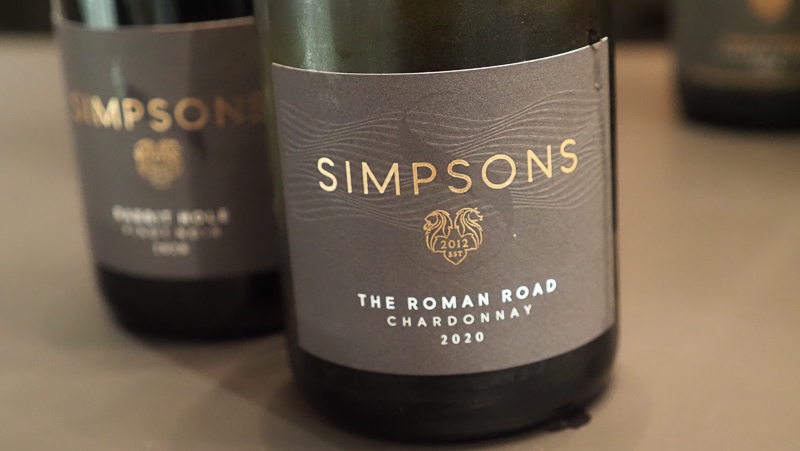
Simpsons The Roman Road Chardonnay 2018 Kent, England
13% alcohol. This is impressive. It’s concentrated and rich with good acidity and some pineapple and pear richness. There’s nice depth here, a touch of smokiness, some minerality, and some spicy oak. Quite oaky right now, but there’s no doubting the quality of the fruit. 91/100
Simpsons The Roman Road Chardonnay 2020 Kent, England
Fifth release of this wine. 13% alcohol. Really intense with some pithy hints and a bit of grapefruit, as well as some nuttiness. There’s also a touch of bitter cherry, keen acidity, and fennel and spice notes. Lively and intense with good structure. There’s a lot going on here: a wall of flavour, finishing tart. 91/100
Simpsons Estate Pinot Noir 2020 Kent, England
Fresh, juicy and bright with a nice sappy edge to the cherry and plum fruit, with some raspberry tartness. Nice fruit purity here. 89/100 (£15.99 Waitrose)
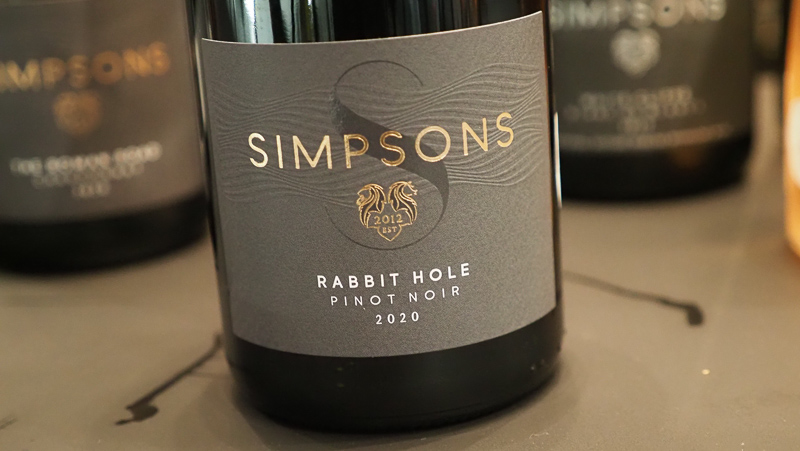
Simpsons Rabbit Hole Pinot Noir 2020 Kent, England
There’s a slight cedary edge to the nose with sweetly aromatic cherry fruit. The palate is supple and elegant with red cherries and plums. So supple and fresh with lovely fruit. Needs a little time for the charry oak to integrate. Very stylish. 91/100
Find these wines with wine-searcher.com

